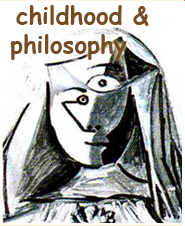philosophical methodology and the mathematization of pedagogy freeing children’s imagination through philosophy
Keywords:
Cartesian methodology, mathematical method vs. dialectical method, complete education, FeyerabendAbstract
This paper traces the genealogy of a long-enduring controversy in Western philosophy viz, whether philosophic and mathematical methodologies are equal but separate and distinct approaches to rational inquiry, or whether one is superior to the other from the standpoint of epistemology, and, ultimately, a pedagogy which supports and promotes conceptual and critical thinking. With the Socratic teacher in mind, philosophic methodology, viewed by Plato as a dialectical process of free-ranging inquiry, compelled him to distinguish the work of philosophy from that of mathematics, since philosophic methodology could not function unless freed from the constraints contained in a system built on axioms, propositions, and images. In his dialogue Meno, Socrates’ pedagogic demonstration, supported by the unique capacity of mathematics to provide epistemic closure, foreshadowed a slow-growing rift between philosophy and mathematics, one which came to a head in the 17th century rationalism of Descartes. In Descartes’ work on methodology, mathematics, by overriding the seemingly inconclusive meanderings of philosophy, became the supreme pathway to knowledge. Philosophy, thereafter, had to fight for its life, while pedagogy, questing more and more for “completeness” through formalization, ironically moved toward a fragmentation and reductionism which a mathematized Cartesian methodology supported. The curriculum divisions which resulted were presaged in Descartes’ writing on methodology; the isolation of the individual learner from the larger community of discourse was supported by Descartes’ “cogito.” Suggested here is that a pedagogic approach to the teaching of mathematics, which extends beyond the limitations of the “single solution” methodology utilized in Meno, is possible—an approach which allows pedagogy to spread the Socratic use of dialectical thinking even into that sphere of apodicticity. This suggests that an alternative to the monistic rationalism of Descartes’ mathematized methodology is possible for pedagogy in general, now bringing back into play what Descartes found expendable—viz. dialectical philosophy itself, dialogical inquiry, history, literature, and the arts. Had Socrates, who came to philosophy primarily as a teacher fascinated with intellectual paradoxes, explored, in Meno, the pedagogic possibility of a dialectical approach to mathematics, his larger work in dialectical pedagogy might have been less teacher-centered—notwithstanding his ironic “ignorance”; and given his historic significance as the most celebrated teacher in Western culture, modern pedagogy might have been less overwhelmed by the Cartesian drive toward mechanized and reductionist “single-solution,” non-communal teaching and thinking.Downloads
Download data is not yet available.
Downloads
Published
2012-01-03
Issue
Section
articles



